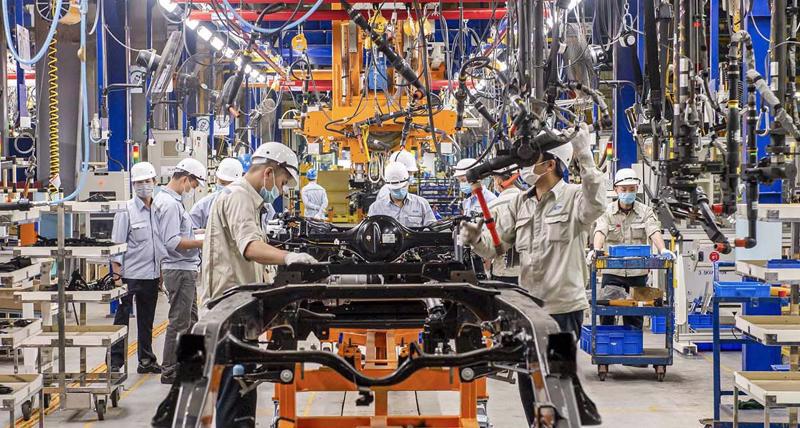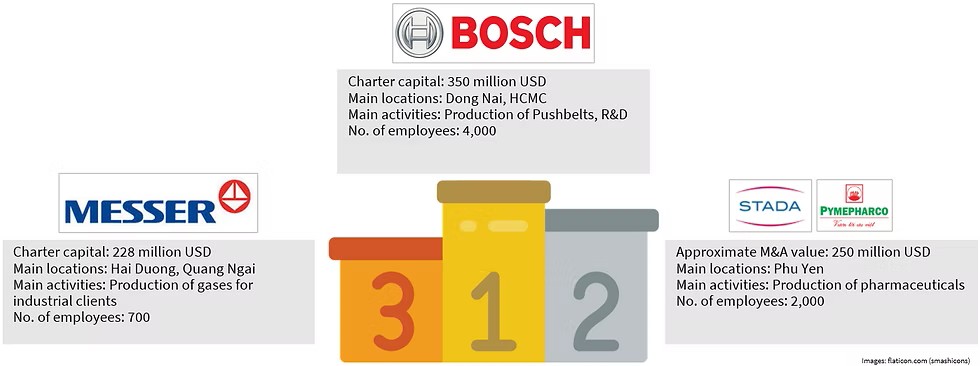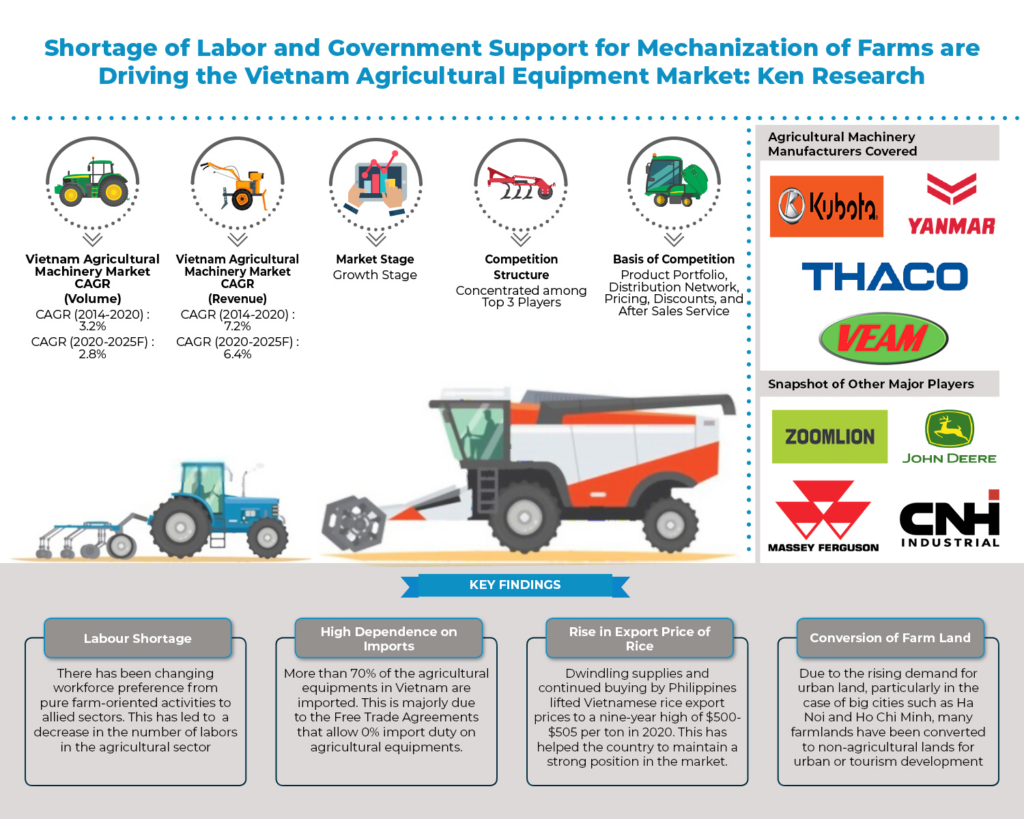German companies in Vietnam have established a significant presence across various industries, including manufacturing, automotive, renewable energy, and consumer goods. Their investments contribute to economic growth, technology transfer, and job creation in the region. Key players such as Bosch, Siemens, and BMW are actively involved, reflecting strong economic ties between Germany and Vietnam.

Vietnam’s rapid industrialization and strategic Southeast Asian location make its machinery production sector a prime target for German companies like Siemens and Bosch, known for precision engineering. With a market driven by demand for automotive parts, industrial equipment, and electronics manufacturing, Vietnam offers low costs and trade perks through agreements like the EU-Vietnam Free Trade Agreement (EVFTA).
However, navigating Vietnam’s legal requirements—business registration, licensing, and compliance—is critical to success. At La Défense Law Firm, we guide German companies through Vietnam’s legal landscape with ease. This guide provides clear legal steps for German firms to invest in Vietnam’s machinery production sector, ensuring a smooth and profitable venture in cities like Hanoi, Ho Chi Minh City, and Da Nang.
Why Vietnam’s Machinery Sector Attracts German Investors
Vietnam’s machinery production sector is thriving, fueled by a $300 billion manufacturing economy and demand for equipment in automotive, electronics, and construction. German firms excel in high-tech machinery, like CNC machines or robotic arms, which align with Vietnam’s push for Industry 4.0. The EVFTA, effective since 2020, eliminates 99% of tariffs on machinery exports to the EU, making Vietnam a cost-effective hub. Plus, German brands enjoy trust in Vietnam’s market, from Hanoi’s factories to Da Nang’s industrial zones.
Start by understanding this demand. La Défense Law Firm analyzes Vietnam’s market needs, ensuring your machinery—say, automation tools for Ho Chi Minh City’s electronics plants or presses for Hanoi’s car parts—meets local standards. We guide compliance with Vietnam’s investment laws, helping your firm tap into Vietnam’s industrial boom with confidence.
Step 1: Register Your German Companies in Vietnam
To invest, German companies must register under Vietnam’s Law on Enterprises, typically as a wholly foreign-owned limited liability company (LLC) or joint venture. Submit a Vietnamese-language application to the Department of Planning and Investment in Hanoi, Ho Chi Minh City, or Bac Ninh, including your business scope, capital (often $200,000 minimum for manufacturing), and company details. Errors, like unclear production plans, can delay approvals from the Ministry of Planning and Investment (MPI).
Legal support simplifies this. La Défense prepares filings for your machinery plant in Hanoi’s Long Bien or Binh Duong’s industrial zones, ensuring compliance with MPI rules. We secure your license, setting your business—whether producing gears in Hai Phong or robotics in Ho Chi Minh City’s District 7—on a solid legal foundation for a fast start.

Step 2: Secure Manufacturing and Environmental Licenses
Machinery production requires a Manufacturing License from the Ministry of Industry and Trade, proving compliance with technical standards and safety protocols. You’ll also need an Environmental Permit, especially for plants handling metals or chemicals, requiring waste management plans filed in Vietnamese. Non-compliance risks fines or shutdowns, delaying your operations in Hanoi’s industrial parks or Da Nang’s factories.
Legal expertise speeds approvals. La Défense compiles license dossiers for your plant in Ho Chi Minh City’s District 9 or Nha Trang, coordinating with authorities. We ensure your machinery—say, lathes for Hanoi’s automotive sector or conveyors for Hoi An’s warehouses—meets Vietnam’s regulations, keeping your production line running without legal hurdles.
Step 3: Choose an Industrial Zone for Cost Savings
Vietnam’s 350+ industrial zones (IZs), like those in Hanoi’s Ba Dinh, Bac Ninh, or Ho Chi Minh City’s District 7, offer ready infrastructure, tax breaks (10% corporate tax for 15 years), and no import duties for exported machinery. German firms benefit from zones near ports in Hai Phong, ideal for shipping to Europe or Asia. However, land leases and local bureaucracy can be complex without guidance.
Legal support optimizes your setup. La Défense advises on IZs, securing leases for your plant in Da Nang or Binh Duong, where German FDI reached $4.6 billion by 2023. We handle Vietnamese contracts, ensuring your facility—producing turbines in Hanoi’s Cau Giay or motors in Ho Chi Minh City’s District 1—benefits from Vietnam’s incentives and logistics.

Step 4: Navigate Taxation and EVFTA Benefits
Vietnam’s corporate tax is 20%, but IZ-based machinery plants may qualify for 10-17% rates for 10-15 years, with additional VAT exemptions for eco-friendly equipment. The EVFTA cuts tariffs on exports, boosting profits for German firms supplying Europe or ASEAN. Tax filings in Vietnamese are mandatory, and transfer pricing scrutiny ensures fair cross-border deals. Errors risk audits, especially for high-tech firms in Hanoi or Ho Chi Minh City.
Legal guidance maximizes savings. La Défense files taxes for your plant in Da Nang or Hai Phong, securing EVFTA tariff reductions and incentives for Hanoi’s green tech. We ensure compliance with Vietnam’s General Department of Taxation, keeping your finances clear so your machinery business—whether in Nha Trang or Bac Ninh—thrives cost-effectively.
Step 5: Hire and Train Staff Legally
Vietnam’s workforce, with engineers and technicians in Hanoi and Ho Chi Minh City, suits machinery production, but the Labor Code requires work permits for German managers, needing notarized degrees and experience. Local hires need Vietnamese contracts, including social insurance (8% employee, 17.5% employer). Training for high-tech systems, like automation, is key but must align with labor laws to avoid disputes.
Legal services ensure compliance. La Défense secures permits for your team in Hanoi’s Hoan Kiem or Da Nang’s factories and drafts contracts for locals in Hoi An. We advise on training programs, ensuring your plant—producing robotics in Ho Chi Minh City’s District 7 or tools in Binh Duong—runs with a skilled, legal workforce ready for German precision.
Step 6: Protect Intellectual Property
German machinery firms rely on patented designs or software, making intellectual property (IP) protection vital in Vietnam’s competitive market. Register trademarks and patents with the National Office of Intellectual Property, using Vietnamese filings. Unprotected IP risks copycats, especially in Hanoi’s tech hubs or Ho Chi Minh City’s industrial parks, harming your brand’s value.
Legal support safeguards your assets. La Défense manages IP registrations for German firms, protecting designs for a CNC machine in Da Nang or software in Hanoi’s Hai Ba Trung. We draft non-disclosure agreements for partnerships in Nha Trang, ensuring your technology stays secure in Vietnam’s fast-paced machinery sector.

Step 7: Address Environmental and Safety Regulations
Machinery production involves chemicals or heavy equipment, requiring environmental compliance under Vietnam’s Ministry of Natural Resources. Permits for emissions or waste disposal are mandatory, especially in Hanoi’s Long Bien or Ho Chi Minh City’s District 9. Safety certifications for equipment, aligned with EU standards via EVFTA, are also needed. Non-compliance risks fines or public backlash.
Legal experts mitigate risks. La Défense secures permits for your plant in Hai Phong or Bac Ninh, ensuring compliance with Vietnam’s environmental and safety laws. We advise on EU-aligned certifications for machinery in Hanoi’s Ba Dinh, protecting your business from regulatory or reputational challenges while meeting Vietnam’s green goals.
Step 8: Navigate Culture and Build Partnerships
Vietnam’s business culture values trust and patience, resonating with German precision but requiring time for deals. Rushing contracts in Hanoi or skipping dinners in Ho Chi Minh City can delay progress. Partnerships with local firms, like Vingroup, offer market access, but Vietnamese bureaucracy in Da Nang or Nha Trang needs careful handling.
Legal support bridges gaps. La Défense coaches German firms on Vietnam’s norms, like respectful talks for factory deals in Hanoi’s Tay Ho or filings in Hoi An. We draft partnership agreements, ensuring your machinery plant—whether in Ho Chi Minh City’s District 3 or Bac Ninh’s IZs—integrates smoothly with Vietnam’s market and culture.

Build Your Machinery Plant with Confidence
Vietnam’s machinery production sector offers German companies low costs, trade perks, and a growing market, but legal compliance is key to success. By registering smartly, securing licenses, and respecting local norms, your plant can thrive in Hanoi, Ho Chi Minh City, or Da Nang. Professional support turns challenges into opportunities, ensuring your investment powers Vietnam’s industrial future.
La Défense Law Firm is here to guide German companies with tailored legal solutions for Vietnam’s machinery sector. Contact us today to launch your production plant and seize this dynamic market.
Orther related legal articles:
- Understanding Employment Law for Foreigners in Vietnam
- Understanding Taxation and Legal Obligations for Expats in Vietnam
- Top 7 Questions to Ask Before Hiring a Foreign Lawyer in Hanoi
- How Foreign Lawyers in Hanoi Bridge Legal and Cultural Gaps

